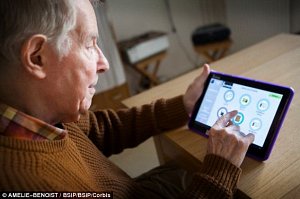Tablets may represent the crossing point against the “digital divide” affecting elders and previous generations. Smaller, lighter and intuitive, those devices open an easier path toward technology.

A research carried out by the New Michigan State University discovered that using tablets makes technology easier to use for elder people, overcoming the traditional barriers of the “digital divide”.
Not only tablets are lighter, smaller and, therefore, easier to carry around, but those devices allow users to perform all the traditional actions such as surfing the web without the need of keyboard and mouse.
It is more than just a lazy choice. Shelia Cotten, a MSU professor who led the research explains: “The dexterity required to control a mouse is really hard for some older adults. […] A certain level of muscle control is needed. And some older adults have shaking issues, in addition to muscle-control issues in their hands and arms.”
Then, Professor Cotten added that further to this, tablets are just more intuitive and easier to use, especially for that people who are not used to technology and don’t have previous computer experience.
“For the most part they are pretty easy to operate,” Cotten added. “You don’t have to click on 12 different things to do what you want to do. It helps to ease their tech anxiety.”
The researchers also noted that when an elders’ family member recommended to them a certain kind of tablet and helped them to understand how it works and learn how to use it, the elders developed a sense of self-confidence toward technology. They learned the basics by observing the others, and then started enjoying it discovering the tablets by themselves.
The capacity of getting online for the elders leads to a feeling of closeness to family and friends, with the senior users finally feeling part of a world that, bathing in technology progresses, left them behind. “For example, it allows them to be more proactive in their health care,” Shelia Cotten explained. “They have access to health information, electronic medical records and so on.”
A previous study by Cotton and colleagues identified that Internet use among the elderly can help reduce and prevent depression. “It’s all about older persons being able to communicate, to stay in contact with their social networks and just not feel lonely,” she explained.
Cotton predicts that the use of tablet by senior users will increase. A sign is given by the recent announcement of collaboration between Apple, IBM and Japan post who explained the aim of disseminating 5 million of tailored iPads to elders in Japan.
Written by: Pietro Paolo Frigenti
